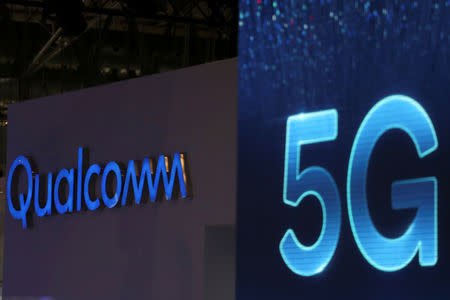Fried chicken vs $13: Apple, Qualcomm explain claims to jury as trial opens
By Stephen Nellis SAN DIEGO, Calif. (Reuters) - Apple Inc and Qualcomm Inc on Tuesday opened a complex trial with the iPhone maker using a fried chicken analogy to illustrate its claim the chip company is abusing its market power while Qualcomm alleged a years-long plan by Apple to deprive it of billions in revenue, $13 at a time. The fate of Qualcomm's business model, which involves licensing more than 130,000 patents in addition to selling chips, is at stake in the case, which consolidates related lawsuits and countersuits. Apple alleges that Qualcomm's patent practices were an illegal move to maintain a monopoly on the market for premium modem chips that connect smart phones to wireless data networks. Qualcomm in turn says Apple used its heft in the electronics business to wrongly order contract factories such as Hon Hai Precision Co Ltd's Foxconn to withhold royalty payments from Qualcomm that Apple had historically reimbursed to the factories. A jury of three women and six men will hear the case over five weeks in the San Diego federal courtroom of Judge Gonzalo Curiel. On Tuesday, attorneys sought to cut through the technological complexity and frame key elements of the case in terms the jury could understand. Apple has objected to a practice that it calls "no license, no chips" under which Qualcomm will not sell chips to a company that has not signed a patent license agreement. Apple attorney Ruffin Cordell likened Qualcomm's policy to a Kentucky Fried Chicken restaurant that refuses to sell a bucket of chicken to customers. "You first have to go over to this different counter, KFL - Kentucky Fried Licensing," Cordell said. "You have to go pay that 'eating license' fee before they'll sell you any chicken." For its part, Qualcomm alleged that Apple bullied its contract manufacturers into choking off royalty payments to Qualcomm. Qualcomm had been doing business with those factories long before the iPhone, Qualcomm said. "The idea that Qualcomm can bully Apple is absolutely remarkable," said Evan Chesler, Qualcomm's attorney. Apple "dwarf us in size, but they cut off that money." Qualcomm portrayed the move as part of a years-long Apple plan to weaken Qualcomm's patent licensing business, showing jurors internal slides from Apple presentations where Apple talked of wanting to "hurt Qualcomm financially." "It was all planned in advance, every bit of it," Chesler said. Chesler also used iPhone price increases to $1,000 or more in recent years to frame Qualcomm's technology licensing fees. "Out of a $1,000 for that phone, what they're not paying us is $13," Chesler said. "What would your iPhone be worth to you if you stepped five feet to the right and the call dropped out? That's Qualcomm, not Apple." (Reporting by Stephen Nellis in San Diego; Editing by Cynthia Osterman)


